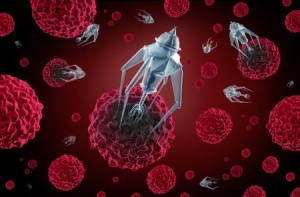There are wide varieties of technologies, which are being used to analyze biological cells to diagnose diseases and develop methodologies to cure diseases. One such technology is ‘Nanotechnology’.
Nanotechnology is the engineering of functional systems at the molecular scale which may exert a revolutionary impact on cancer diagnosis and therapy. Nanotechnology is being applied to cancer in two broad areas: i) the development of nanovectors such as nanoparticles which can be loaded with drugs or imaging agents and then targeted to tumours, and ii) high-throughput nanosensor devices for detecting the biological signatures of cancer. Combined, such technologies could lead to earlier diagnosis and better treatment for cancer patients.
Most common methods used for the cancer treatment are (i) Chemotherapy, a treatment with powerful medicines (ii) Radiation therapy, a treatment given through external high-energy rays.
Both the treatments are harmful as healthy cells are destroyed in the process. As a result, this leaves the patient very weak, causing him not able to recover quickly to medical treatments.
The nanodevices are programmed to destroy affected cells and kill only them, thus ending the problem of destroying any normally functioning cells which are essential to one’s well-being. Thus the treatment-using nanotechnology will make the affected man perfectly normal.
Nanodevices can provide rapid and sensitive detection of cancer-related molecules by enabling scientists to detect molecular changes even when they occur only in a small percentage of cells. Nanoscale devices have the potential to radically change cancer therapy for the better and to dramatically increase the number of highly effective therapeutic agents.
Nanoparticulate technology can prove to be very useful in cancer therapy allowing for effective and targeted drug delivery by overcoming the many biological, biophysical and biomedical barriers that the body stages against a standard intervention such as the administration of drugs or contrast agents.
Nanotechnology doesn’t affect the healthy cells and the cancer affected person is healthy after the treatment. The treatment doesn’t involve critical operations. The treatment will not take longer time as in any other treatments. Hence nanotechnology can help solve one of the most challenging and longstanding problems in medicine, which is how to eliminate cancer without harming normal body tissue.

